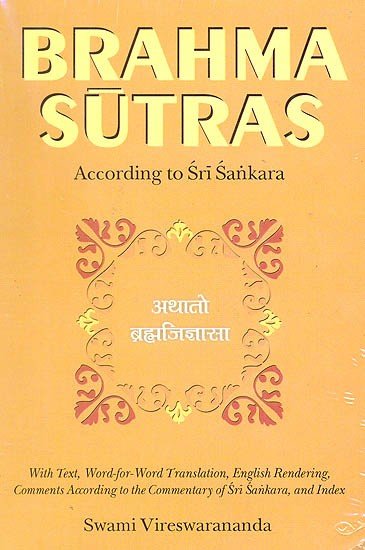Brahma Sutras (Shankara Bhashya)
by Swami Vireshwarananda | 1936 | 124,571 words | ISBN-10: 8175050063
This is the English translation of the Brahma-sutras including the commentary (Bhashya) of Shankara. The Brahma-sutra (or, Vedanta-sutra) is one of the three canonical texts of the Vedanta school of Hindu philosophy and represents an early exposition the Vedantic interpretation of the Upanishads. This edition has the original Sanskrit text, the r...
Chapter IV, Section III, Adhikarana III
Adhikarana summary: Characteristics of the soul that has attained the Nirguna Brahman
Sutra 4,4.5
ब्राह्मेण जैमिनिः, उपन्यासादिभ्यः ॥ ५ ॥
brāhmeṇa jaiminiḥ, upanyāsādibhyaḥ || 5 ||
brāhmeṇa—As possessed of the attributes of Brahman; jaiminiḥ—(so says) Jaimini; upanyāsādibhyaḥ—on account of the reference etc.
5. (The liberated soul exists) as possessed of the attributes of Brahman; (so says) Jaimini, on account of the reference etc.
It has been said that the liberated soul attains Brahman. But Brahman has two aspects; one the unconditioned aspect as Pure Intelligence and Knowledge; the other as described in the Chhandogya 8. 7. I, “The Self which is free from evil, undecaying, undying, free from sorrow, hunger and thirst, with true desires and volition” etc. The question is, which aspect doe& the liberated soul attain? Jaimini says that it is the conditioned aspect. Why? On account of the reference to the nature of the Self as being such in the text cited. ‘Etc.’ includes Vidhi and Vyapadesa. The Vidhi or injunction referred to is, “That is to be sought after,” which the same Chhandogya text enjoins later on, and Vyapadesa or assertion is the mention of the qualities of omniscience and omnipotence in the same text—“Obtains all worlds and all desires.” On these grounds Jaimini thinks that the liberated soul pttains the conditioned aspect of Brahman.
Sutra 4,4.6
चितितन्मात्रेण तदात्मकत्वादित्यौडुलोमिः ॥ ६ ॥
cititanmātreṇa tadātmakatvādityauḍulomiḥ || 6 ||
citi-tanmātreṇa—Solely as Pure Intelligence; tat-ātmakatvāt—that being its true nature; iti—thus; auḍulomiḥ—Audulomi (thinks).
6. (The liberated soul exists) solely as Pure Intelligence, that being its true nature ; thus Audulomi (thinks).
This Sutra gives another view about the liberated state, whfch is that of the sage Audulomi. The soul being solely of the nature of Pure Intelligence, it exists as such in the liberated state. Qualities like being free from sin and omniscience are fanciful, and mean only the absence of sin etc.
Sutra 4,4.7
एवमप्युपन्यासात् पूर्वभावादविरोधं बादरायणः ॥ ७ ॥
evamapyupanyāsāt pūrvabhāvādavirodhaṃ bādarāyaṇaḥ || 7 ||
evam—Thus; api—even; upanyāsāt—on account of reference; pūrvabhāvāt—the former qualities existing; avirodhaṃ—there is no contradiction; bādarāyaṇaḥ—(so says) Badarayana.
7. Even if it be so (i.e. if the liberated soul exists as Pure Intelligence), on account of forftier qualities existing owing to reference (we can accept them from the relative standpoint, for) there is no contradiction (between the two); (so thinks) Badarayana.
Even though from the absolute standpoint the nature of the liberated soul is Pure Intelligence, yet from the relative standpoint qualities referred to by Jaimini can be accepted, as this does not contradict Audulomi’s view. The released soul never thinks of itself as omniscient, omnipotent, etc., but exists as Pure Intelligence. But from our relative standpoint we can say of such a released soul as being omniscient etc., because Pure Intelligence is beyond our conception. The two views describe the liberated soul from two different standpoints, and so there is no contradiction between the two. So says Badarayana.
